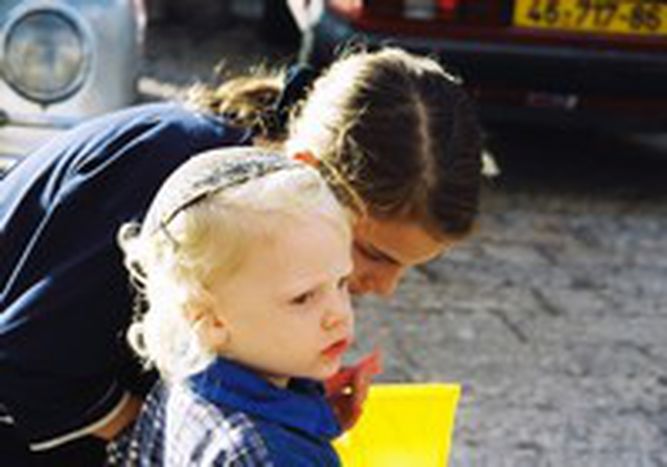
Jews in Europe: so close, so far
Published on
Translation by:
 luke croll
luke croll
An old proverb says, ‘2 Jews, 3 opinions.’ In terms of the conflict in Israel, however, the Jewish community in Europe is speaking with one voice: the EU is a minor player and lacks credibility.
In the Rue des Rosiers, Paris, the heart of the Jewish quarter is beating. In a rush, two rabbis disappear into the winding back streets, whilst the morning sun reflects off windows packed with appetising bagels. The spicy smell of falafel fills the air. 600,000 Jews live in France, making it the largest Jewish community in Europe. Belgium has 30,000 faithful and the United Kingdom, 300,000. Within the 25 member states, Judaism is organised around three fundamental institutions: the Conference of European Rabbis for religious issues, the European Council of Jewish Communities and the European Jewish Congress (EJC), dealing with political problems.
Where is the EU?
For the majority of Jews, the EU is a distant being. According to Marc Knobel, a researcher at the Representative Council of Jewish Institutions of France (CRIF), the EU’s foreign policy is “weak, and relations with the Middle East are only seen through the eyes of national governments. Even if there is a very strong link with Israel, Jews are first and foremost citizens of the country in which they live.” This distance is increased by different attitudes amongst member states. “The EU is unable to speak with one voice: whilst France is traditionally pro-Arab, Italy is more supportive of the Hebrew state,” Knobel emphasises.
The general atmosphere of distrust regarding Community institutions is further exacerbated by outbreaks of anti-Semitism in Europe: from Prince Harry dressing up as an SS officer to the murder of Ilan Halimi, controversy left an indelible footprint on 2005. “The increase in anti-Semitic acts in Europe has created a shift to the right in Jewish communities,” says Jean-Yves Camus, a political scientist at the European Monitoring Centre on Racism and Xenophobia (EUMC). “What have the consequences been? Since the second Intifada [in 2000], the Jews do not like EU policy and the true militants are strongly opposed to any form of aid being given to the Palestinian Authority.”
Where is the money going?
Without necessarily denying the suffering of the Palestinians, many people wonder about the use of funds from Brussels. Jon Benjamin, the head of the Board of Deputies of British Jews, is sceptical. “When we see the level of corruption in the Arafat years, I think we have to be very careful to ensure that the money is used for humanitarian purposes and not military or terrorist ends.” Léa Magnichever, a bookseller in the Marais area of Paris, is even more categorical. “The EU has not been fastidious, as we know that the money it gave the Palestinian Authority was used to publish school textbooks that did not even mention Israel, or called for its destruction. It is unacceptable: it is a complete lack of judgement and responsibility. As far as I’m concerned, Brussels has failed in its mission as a peacemaker.”
Alejandro Baer, a lecturer at Madrid’s Complutense University, is more moderate. He believes that the 120 million euros recently unfrozen by the Europeans is a “mistake, since it lets Hamas believe that the financial door is still open, without the need to respect European conditions, such as an end to terrorism or recognising Israel.” These criticisms go hand in hand with a strong feeling of injustice. “If Europe wants to play a role in the conflict, it needs to be somewhat more open to the arguments of the Hebrew state and have more even-handed policies,” states Knobel. At the Paris headquarters of the EJC, its president, Pierre Besnainou, calls for a hard line. “It is inconceivable to us that the EU gives money to an organisation which it itself calls ‘terrorist’. Its entire credibility is called into question.”
Less talk, more action
Another sensitive issue is Iran. Faced with Mahmoud Ahmadinejad’s repeated provocation regarding Israel, the EJC’s action has been swift: a petition aimed at passing a Resolution declaring the Iranian president ‘persona non grata’ in Europe is doing the rounds at the Parliament in Strasbourg. “This is a natural step,” says Besnainou, “given the various laws on Holocaust denial passed in the 25 member states.” Furthermore, “a complaint has been lodged with International Criminal Court, asking that incitement to genocide [should] be considered as the start of genocide.” This two-faceted approach is one of the strongest and most noticeable that CJE has taken since its creation in 1986. “However, I regret that we had to be ones to take this step: the Iranian issue should worry everyone, and not just Jews,” insists Besnainou.
In the meantime, people are quick to point the finger at the willingness of the European Troika to negotiate on Iran’s nuclear ambitions, particularly in Germany. Last December, Paul Spiegel, a representative of the Central Council of Jews in Germany, said, “the policy of appeasing Iran by European governments must end. We need to examine and implement all possibilities: economic sanctions, political sanctions, or even expulsion from the UN. For anyone who wants to be taken seriously on a global political level, it is a question of action, not words.” David Reinhardt, a member of Betar-Tagar, a radical Zionist organisation, only believes in American help. “The EU is nothing but an empty shell which could not even prevent ethnic cleansing on its own soil, in the former Yugoslavia. Let them agree on the price of wine before getting involved in the Israeli-Palestinian conflict.” That is indeed a word to the wise!
Translated from Les juifs d’Europe contre Bruxelles (tout contre)


